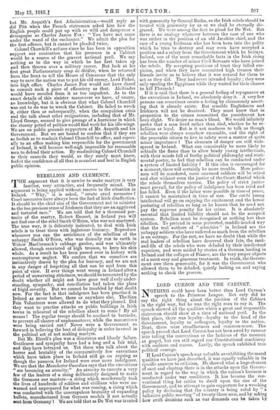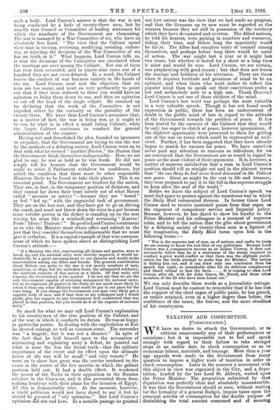LORD CURZON AND THE CABINET.
NOTHING could have been better than Lord Curzon's speech to the Primrose League. Not only did he say the right thing about the position of the Cabinet in the right way, but he was the right man to say it. The speech showed all the qualities which a great and responsible statesman should show at a time of national peril.' In the first place, there was loyalty—loyalty to the head of the Government, loyalty to colleagues, loyalty to the nation. Next, there were steadfastness and common-sense. The speech proved that Lord Curzon has not been awed by rumour into taking the conventions or the fashions of the moment as gospel, but can still regard our Constitutional michiziery with coolness and reason. Lastly, the speech exhibited true political courage.
If Lord Curzon's speech was valuable as exhibiting the moral qualities we have just described, it was equally valuable in its specific answers to criticism. He showed what a huge element of cant and claptrap there is in the attacks upon the Govern- ment in regard to the way in which the nation's business is conducted under war conditions. It his become the Con- ventional thing for critics to dwell upon the size of the Government, and to attempt to gain supporters for a wrecking policy by declaring that the country is being ruled by, " a talkative public meeting " of twenty-three men, and by asking how swift decisions such as war d.emands can be taken by such a body. Lord Curzon's answer is that the war is not being conducted by a body of twenty-three men, but by exactly that Council or Committee of leading statesmen for which the assailants of the Government are clamouring. The war is managed by a War Committee of six, who have an absolutely free hand. " The view that the Cabinet spend their time in viewing, reviewing, modifying, mending, endors- ing, or rejecting the decisions of the War Committee of six has no truth in it." What happens, Lord Curzon tells us, is that the decisions of the Committee are circulated when the meetings are over among the Cabinet. Not one of them has ever been overruled, and in ninety-nine cases out of a hundred they are not even debated. In a word, the Cabinet leaves the conduct of war business entirely in the hands of the six. Lord Curzon next met the objection that six men are too many, and went on very pertinently to point out that if they were reduced to three you would have an agitation to bring them down to one, and then an agitation to cut off the head of the single culprit. He summed up by declaring that the work of the Committee is not impeded either by the curiosity or the garrulity of the twenty-three. We have thus Lord Curzon's assurance that, as a matter of fact, the war is being run, as it ought to be run, by what is in effect a small ruling Cabinet, while the larger Cabinet continues to conduct the general administration of the country. Having met and demolished the plea, founded on ignorance or prejudice, that the Government are trying to run the war by the methods of a debating society, Lord Curzon went on to deal with what he termed " another illusion," the illusion that the Government think themselves indispensable. Here, we are glad to say, he was as bold as he was frank. He did not simply tell his hearers that the Government would be ready to retire if Parliament withdrew its confidence, but added the condition that there must be other responsible Ministers likely to be found to take their places. This is an essential point. The Government are trustees for the nation. They are, in fact, in the temporary position of dictators, and they cannot lay down their trust merely out of what Bacon called " niceness or satiety "—because they are " bored " or feel " fed up " with the ungrateful task of government. They are on the box-seat, and they have got to go on driving the coach, and must not throw down the reins in a pet because some voluble person in the dickey is standing up on the seat waving his arms like a windmill and screaming " Knaves ! Fools ! Idiots ! Traitors ! " So good is Lord Curzon's statement as to why the Ministry must retain office and submit to the jeer that they consider themselves indispensable that we must give it verbatim. It is a capital example of that wise common- sense of which we have spoken above as distinguishing Lord Curzon's attitude :- " If a Ministry like this, representing all classes and parties, were to break up, and the national unity were thereby impaired, it would un- doubtedly be a great encouragement to our enemies and would strike consternation among our Allies and friends. The greatest contribution Great Britain can make to the war is not merely numbers of men, munitions, or ships, but the unbroken front, the unimpaired solidarity, the stubborn tenacity of this nation as a whole. Of that unity and tenacity the Government is the symboL I do not say that we are the only Government capable of retaining unimpaired the national unity, but as we represent all parties in the State we are much more likely to retain it than any other Ministry that could be put in our place for the time being. If you change the Government you may very likely get a superior body of men, and if that were so my colleagues and I would gladly give our support to any Government well constituted that was placed in that position, but you would do it at the expense of national unity."
So much for what we may call Lord Curzon's explanation to his countrymen of the true position of the Cabinet and of the way in which it conducts its duties. He was as happy in particular points. In dealing with the capitulation at Kut he showed courage as well as common-sense. The surrender was " a tragedy, but it was not a disaster." In spite of the fact that he laid himself open to the accusation of minimizing and explaining away a defeat, ho pointed out what is none the less the literal truth—that the military importance of the event and its effect upon the ultimate issues of the war will be small " and very remote." He went on to show how great was the service rendered to the cause in the course of the five months in which the gallant garrison held out. It had a double effect. It weakened the power of the Turks in their opposition to the Russian advance in the Caucasus, and it also prevented them from making headway with their plans for the invasion of Egypt. All this is demonstrably true. At the moment, however, a timid politician would not have dared to say it lest he should be accused of " oily optimism." But Lord Curzon's optimism chid not end here. In a notable passage he pointed out how untrue was the view that we had made no progress, and that the Germans up to now must be regarded as the winners because they are still in possession of the territory which they have devastated and overrun. The Allied nations, he told his hearers, were gaining in numbers and resources, biding their time, and before long the superiority would be theirs. The Allies had complete unity of counsel among themselves, and perhaps before long there would be unity of action. The war might last a year or it might last two years, but whether it lasted for a short or a long time it must and would be won. Lord Curzon, we are certain, was prophesying with good reason ; but that does not lessen the courage and boldness of his utterance. There are times when it requires fortitude and greatness of mind to be an optimist, and when those who want rather to reflect the popular mind than to speak out their convictions prefer a low and melancholy note to a high one. Thank Heaven 1 Lord Curzon is not one of these shirkers of the mind.
Lord Curzon's last word was perhaps the most valuable in a very valuable speech. Though it has not found much expression in public, there has been an undercurrent of doubt in the public mind of late in regard to the attitude of the Government towards the problem of peace. It has been hinted by the enemies of the Cabinet that they would be only too eager to clutch at peace, however ignominious, if the slightest opportunity were presented to them for getting out of the war on terms which could be represented as suili- cient. Further, it has been suggested that they have already begun to search for excuses for peace. We have ourselves never paid any attention to rumours so ridiculous, for we are convinced that the Government are as sound in regard to peace as the most violent of their opponents. It is, however, a matter of supreme satisfaction that a man in Lord Curzon's position should tall us straight out and in the plainest terms that " the one thing he had never heard discussed in the Cabinet was peace. Great as might be the cost in life and treasure, they were prepared to pay it to the full in this supreme struggle to keep alive the soul of the world."
Before we leave the subject of Lord Curzon's speech we must find space to protest against the monstrous way in which the Daily Mail commented thereon. In former times Lord Curzon used to receive unstinted praise from that organ as the exponent of compulsory service and Imperial policy. Because, however, he has dared to show his loyalty to the Prime Minister and his colleagues in a moment of supreme crisis, and to tell the nation that the gibe about government by a debating society of twenty-three men is a figment of the imagination, the Daily Mail turns upon him in the following terms :- " War is the supreme test of men, as of nations, and under its trials we are coming to know the real fibre of our politicians. Because Lord Curzon was a comparative success as an Indian Viceroy, it does not necessarily follow that he is a statesman of the stamp required to conduct a great world-conflict or that there was the slightest justifi- cation for the futile attempt to make him Air Minister. The nation is finding him out, and it can draw only one conclusion from hie speech last night, so remarkable alike for its delicious complacency and bland refusal to face the facts. . . . It is coming to class Lord Curzon, after all, with Sir John Simon, Mr. Birrell, and those other members of the 23 who have been found out."
We can only describe these words as a journalistic outrage. Lord Curzon must be content to remember that if he has lost the support of the chief organ of public panic, he has gained, or rather retained, even in a higher degree than before, the confidence of the saner, the braver, and the more steadfast of his countrymen.



























 Previous page
Previous page